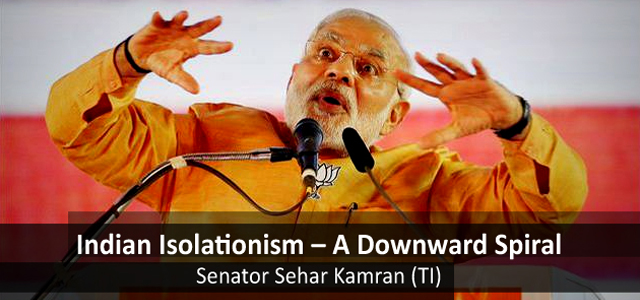By Senator Sehar Kamran (TI)
Jun 29, 2015
 Several belligerent statements towards Pakistan from the top brass of Indian leadership have been making headlines in both countries for the past few weeks. The first statement came from the Indian Prime Minister, stating the China Pakistan Economic Corridor (CPEC) was ‘unacceptable’ to India. This was followed by the Defence minister, Manohar Parrikar, saying, “We have to neutralize terrorists through terrorists only. Why can’t we do it? We should do it. Why does my soldier have to do it”. Then, in the wake of the cross border attack (although denied by Myanmar government) Junior Minister for Information and Broadcasting, Rajyavardhan Singh Rathore asserted “we will carry out surgical strikes at the place and time of our own choosing”. He further added, “Western disturbances will also be equally dealt with.” The cherry on the cake was the statement by Prime Minister Modi in his Dhaka University address, where he openly acknowledged the role of India in the disintegration Pakistan.
Several belligerent statements towards Pakistan from the top brass of Indian leadership have been making headlines in both countries for the past few weeks. The first statement came from the Indian Prime Minister, stating the China Pakistan Economic Corridor (CPEC) was ‘unacceptable’ to India. This was followed by the Defence minister, Manohar Parrikar, saying, “We have to neutralize terrorists through terrorists only. Why can’t we do it? We should do it. Why does my soldier have to do it”. Then, in the wake of the cross border attack (although denied by Myanmar government) Junior Minister for Information and Broadcasting, Rajyavardhan Singh Rathore asserted “we will carry out surgical strikes at the place and time of our own choosing”. He further added, “Western disturbances will also be equally dealt with.” The cherry on the cake was the statement by Prime Minister Modi in his Dhaka University address, where he openly acknowledged the role of India in the disintegration Pakistan.
These statements caused uproar within the civil and military leadership circles, and have justifiably evoked a strong reaction in Pakistan. From the Pakistani perspective, therefore, the most important question becomes the critical assessment of these statements; should they be taken as part of the pattern of BJP’s traditional bellicose rhetoric towards Pakistan for gaining political mileage with their domestic electorate? Or should they carry greater weight and be taken as the beginning of the official new Indian discourse towards its neighboring countries?
In order to test the purpose of these statements, it is important to analyze the context in which they were made. Given that there is no likelihood of an electoral campaign in India anytime soon which could require a harsh stance from BJP to assure them of a win, it is unlikely that the primary target group for these statements is the domestic electorate. The question then becomes one of discourse development; in this regard, three important aspects of Indian diplomacy must be highlighted and examined.
The first is related to the issue of Kashmir; this issue was recently highlighted in international media in light of the peaceful, pro-Pakistani demonstrations that were held in the Indian-occupied Kashmir. The statements about ‘using terrorism against Pakistan’, and regarding the conduct of operations in neighboring countries appears to be another attempt to assimilate the concept of ‘terrorism’ with the freedom struggle in Kashmir. This claim is substantiated by the fact the all cross-border troop mobilizations since 2001 have been the result of Indian allegations of cross border terrorism. Furthermore, all meetings held under the Joint Anti-Terrorism Mechanism (JATM) have failed to produce any substantial progress on the issue of terrorism, as India has been adamant to bring the freedom struggle in Indian-occupied Kashmir under the definition of ‘terrorism’, which is not acceptable to Pakistan.
Ironically, despite the fact that India has violated all United Nations resolutions on Kashmir, it aspires to permanent membership of the United Nations Security Council. Modi, in his Dhaka address, went so far as to justify India’s role in the 1971 war as a humanitarian one, all the while failing to acknowledge the humanitarian crises that persist in Kashmir, thereby demonstrating the self-contradictory nature of Indian policy. Moreover, the qualification for the membership of the United Nations Security (Council UNSC) does not lie in violating its resolutions. Rather, it is a taken as very basic grounds for disqualification. Such display of aggressive behavior towards neighbors – such as the fermenting of violence in Sri Lanka, Nepal and cross border incursions in these states – is a display of hegemonic tendencies and attitudes not worthy of a state deemed qualified to become a permanent UNSC member.
The second important aspect of this hostility is the strengthening position of Pakistan vis-à-vis India in South Asia. During the last few years, Pakistan has made remarkable achievements in strengthening its relations with China and Afghanistan. In Afghanistan, the policies of Ashraf Ghani and the proactive approach of the civil-military leadership in Pakistan have shifted the traditional strategic calculus of Afghanistan in favor of Pakistan. The previously utilized tool of ‘proxy warfare’ has been rejected by Ghani in the last SAARC summit, while substantiating Pakistan’s claim that India intended to use Afghanistan against it for strategic purposes. The military to military relations between Afghanistan and Pakistan, especially on the matters of intelligence-sharing and joint actions against terrorism, as well as acknowledging and seeking a proactive role by Pakistan in the Afghan peace process shows how India has lost Afghanistan to Pakistan.
Another problem for India, as previously indicated, is the China Pakistan Economic Corridor (CPEC) and the Gwadar port. The Indian PM has categorically stated that the CPEC is not ‘acceptable’ to India; it has simultaneously also launched a plan to develop the Chabahar port as an alternate route of access for Central Asian resources. Iran, however, is looking towards Pakistan and China, particularly after its nuclear deal with P5+1 gets materialized. It is looking to improve both economic and trade relations with China in particular, the best possible gateway for which is offered by China Pakistan Economic Corridor. Pakistan also stands to benefit greatly from the Iran-Pakistan gas pipeline project, which was abandoned in haste amid US pressure, should this deal come through. Furthermore, the Asian Infrastructure Investment bank makes China a formidable economic power on the global stage – one that is highly unlikely to compromise its interests in these deals over Indian insecurity.
This argument is further supported by the fact that in December 2014, Pakistan and Iran signed five MoUs to enhance bilateral trade and investment. The Pakistan’s Federal Minister for Commerce also expressed Pakistan’s wish to operationalize all current Preferential Trade Agreements with Iran.
The third factor behind the recent Indian aggression is the growing influence of China in South Asia. China has expanded its scope and investment in Myanmar, Bangladesh, Sri Lanka and Pakistan, which is tantamount to strategic encirclement for India. It places India at a precarious position in regional affairs. Its ambitions to become the regional ‘police state’ have been challenged. Formerly, India had been an active partner of the United States in their policy of containing China. Of the resultant benefits, India not only enjoyed a Nuclear Suppliers Group (NSG) waiver within the nuclear realm, but also nurtured the dream of becoming the sole hegemon within the Indian Ocean. However, China’s countermoves, based on economic expansion in the region and supporting engagement with Pakistan for its membership bid in the NSG, has rendered India virtually isolated.
Against this backdrop, the hostile diplomacy is a sign of increasing Indian frustration. However such wild diplomatic faux pas will not end Indian isolation, rather they will further deteriorate its relations with regional states. This fact has been realized by the opposition, the Indian National Congress Party, which has censured the BJP for tarnishing India’s image in the region. Similarly, political leaders in both China and Pakistan have reaffirmed repeatedly that the CPEC is a project for the betterment of the region as a whole, and will prove highly beneficial to all party states; yet the immature Indian reactions highlight the lack of strategic and diplomatic acumen to benefit from such positive developments.
Pakistan’s response, both from the civil and military leadership, is commendable, as it conveys a clear message to India that any misadventure and miscalculation will invite only catastrophic consequences. Action in Myanmar, notwithstanding the denial of the event by the latter, cannot be equated to action in Pakistan, and will only amount to a massive strategic blunder. Any such military adventurism will bring disastrous consequences to the region. Furthermore, in adopting such a hostile stance in recent weeks, India has only further isolated itself, and tarnished its image as a responsible and pro-regional integration state, in stark contrast to its popular international rhetoric.


